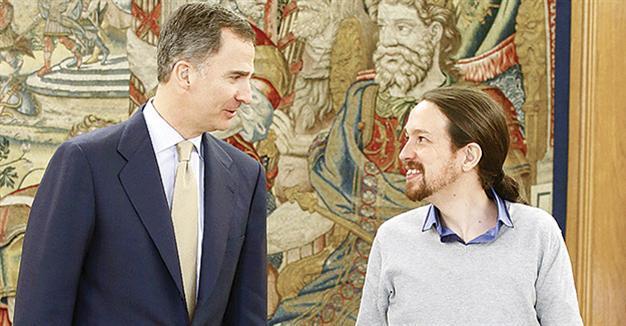Spain to hold elections on June 26, the second in six months
MADRID - Agence France-Presse
 Weary Spaniards will head back to the polls for the second time in six months after King Felipe on May 3 called fresh elections for June 26, which surveys suggest may result in yet another hung parliament.
Weary Spaniards will head back to the polls for the second time in six months after King Felipe on May 3 called fresh elections for June 26, which surveys suggest may result in yet another hung parliament.The king signed a decree dissolving parliament in the the eurozone's fourth largest economy after political parties failed to agree on a coalition to install a new government following inconclusive December 20 elections.
Spain never had to repeat elections since the country returned to democracy following the death of long-time dictator General Francisco Franco in 1975.
"It is the first time that this has happened in the democratic era because we were unable to fulfill the mandate citizens gave us to reach an agreement with a sufficient majority to form a government", Lopez told reporters.
Spain will be left with a caretaker government for several more months as it battles a high unemployment rate of 21 percent and European Union's highest public deficit after Greece's.
December's vote put an end to Spain's traditional two-party system as voters fed up with austerity, unemployment and corruption scandals flocked to new groups, resulting in a hung parliament.
Spain has never had a coalition government and parties tried in vain since the polls to cobble together an alliance which had enough support to be able to pass a parliamentary vote of confidence.
Much of the negotiations had centred around left-wing parties after Prime Minister Mariano Rajoy -- whose conservative Popular Party (PP) won the December election but lost its majority -- gave up trying to form a government for lack of support.
The Socialists (PSOE) -- who came second in the polls with just 90 parliamentary seats out of 350 -- were tasked by the king to try and bring other parties together in a coalition, but ultimately failed.
Socialist leader Pedro Sanchez managed to strike a deal on a government with centrist upstart Ciudadanos -- which came fourth in the election -- but the two parties had too few seats in parliament to win a vote of confidence.
He then tried to enlist the support of far-left party Podemos, whose 65 parliamentary seats would have got it through, but failed.
But polls suggest that fresh elections will do little to change the December outcome, which saw four parties win much of the parliamentary seats -- but not enough each to gain power.
Rajoy's conservatives could gain ground, while new far-left party Podemos may lose as some of the five million people who voted for the party and its allies believe it should have worked with the Socialists.
Analysts say parties will likely be more willing to compromise after fresh polls as voters will be impatient for a government to be formed.
A possible game changer in fresh elections would be an alliance of Podemos with the smaller Izquierda Unida, a communist-green party headed that got 800,000 votes in December.
The two parties are discussing the possibility. The aim would be to surpass the Socialists in new elections, giving Podemos even more influence than it gained in December.
















